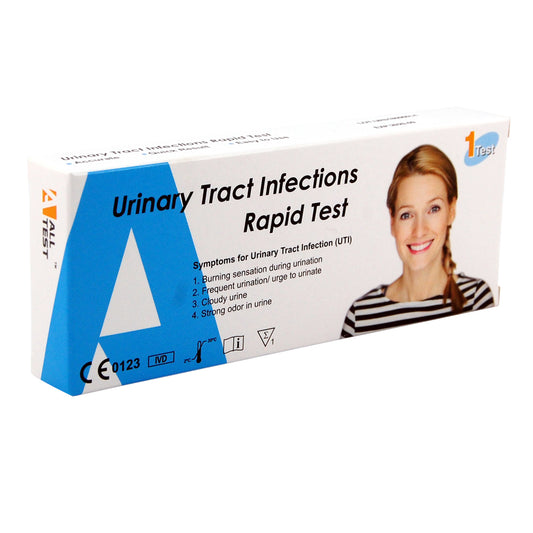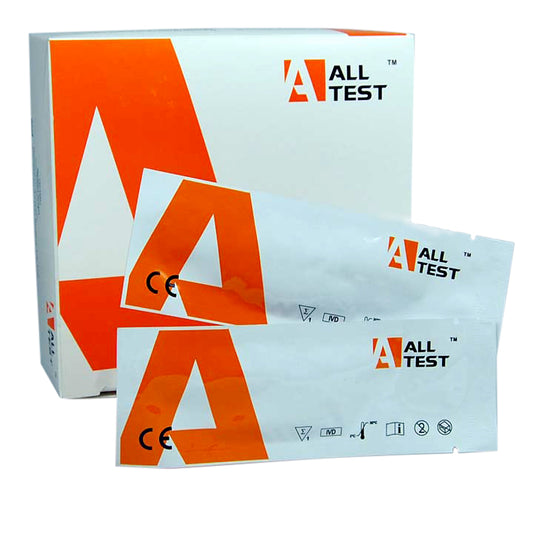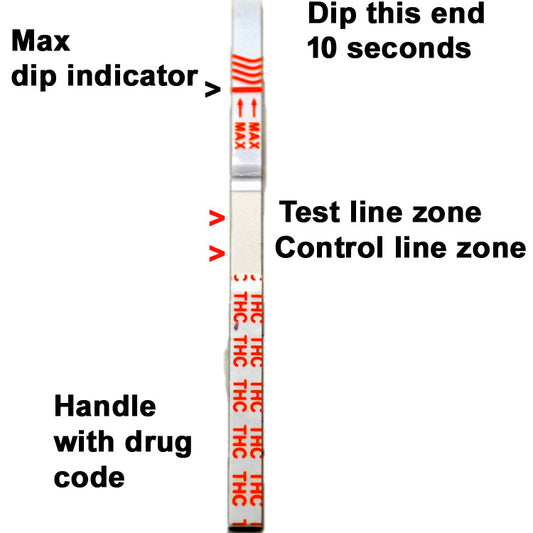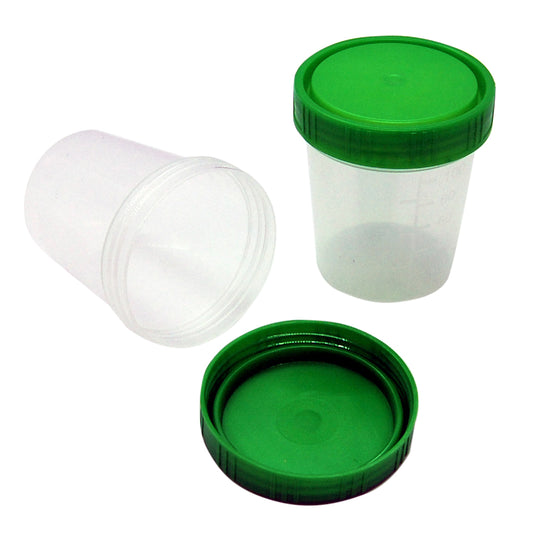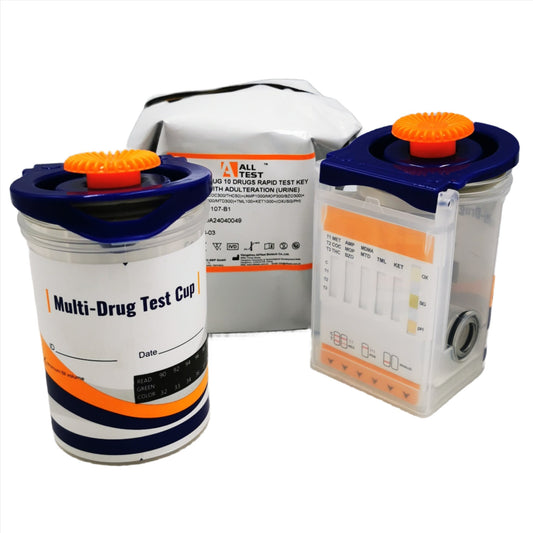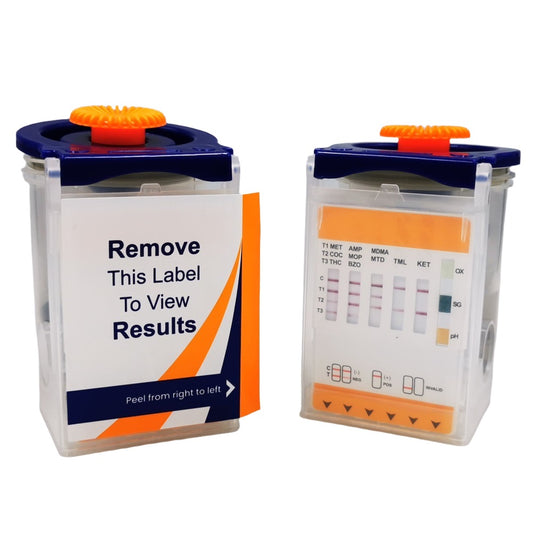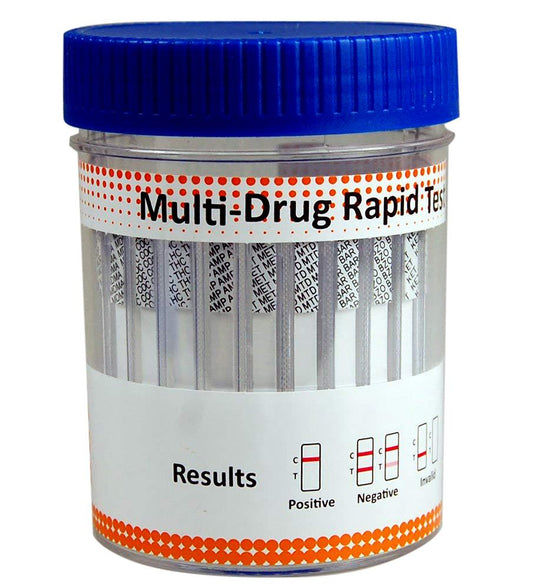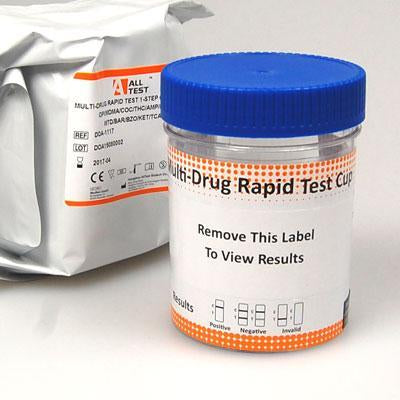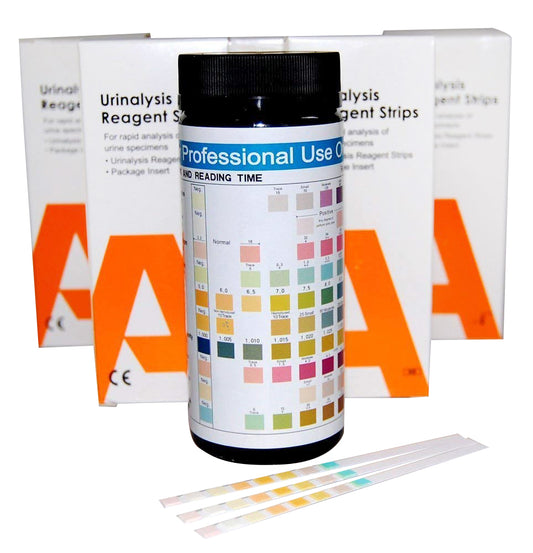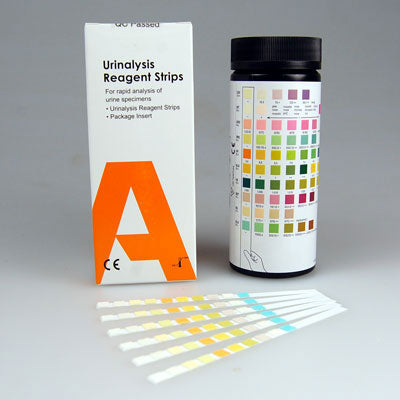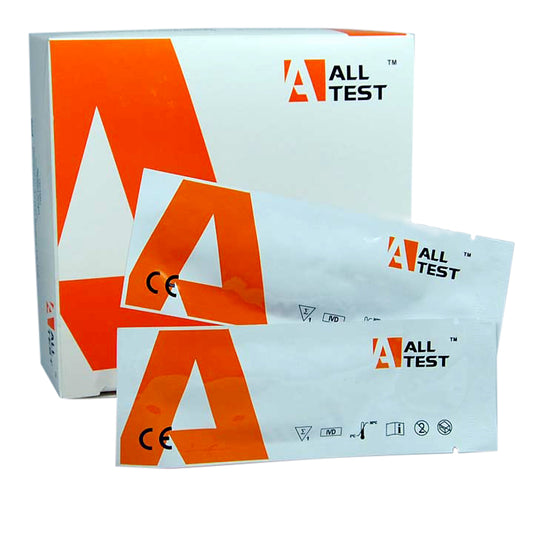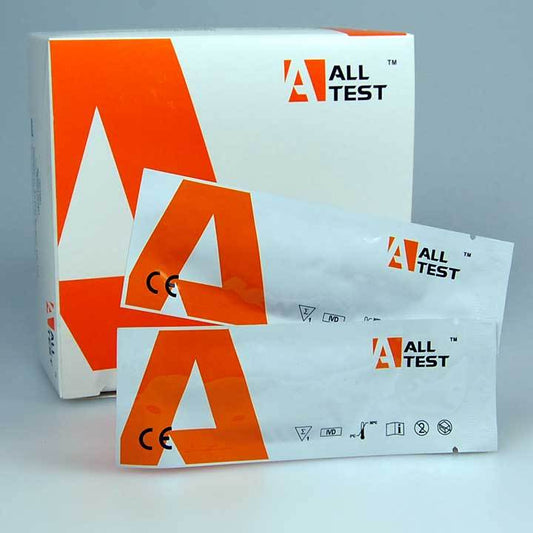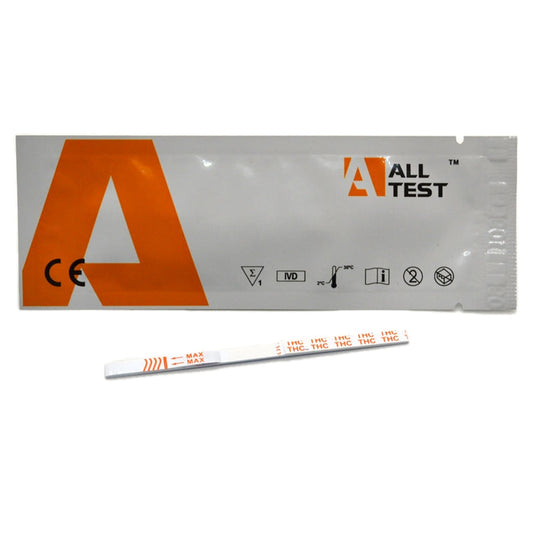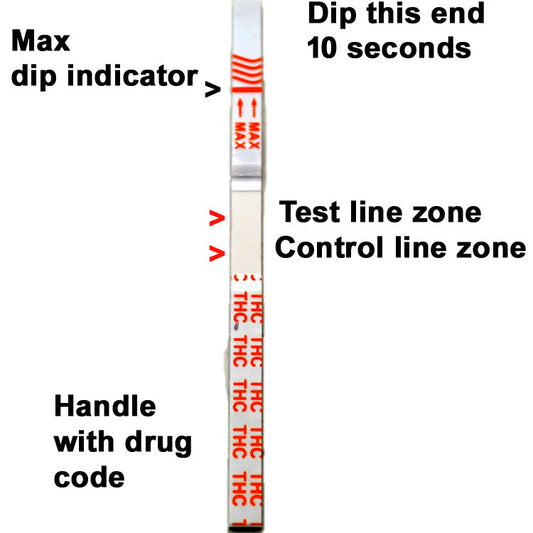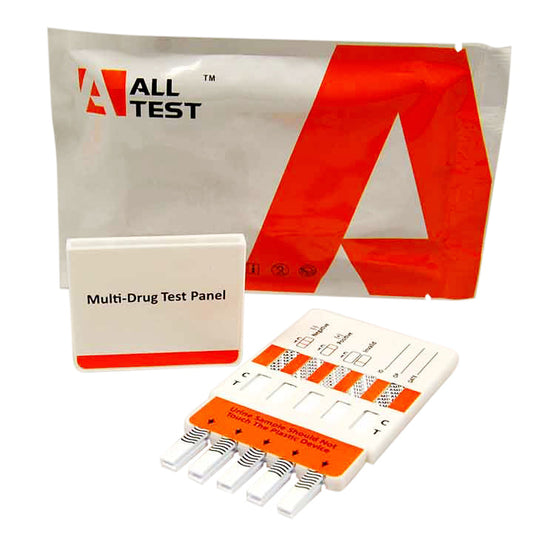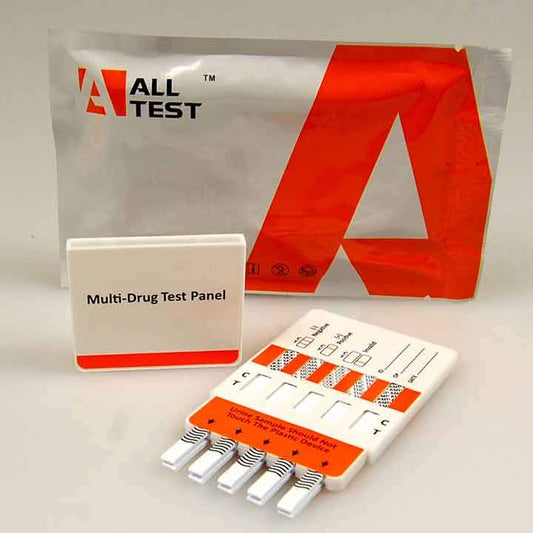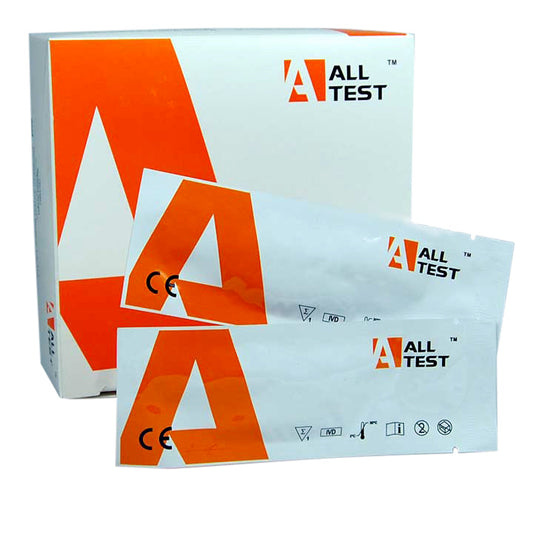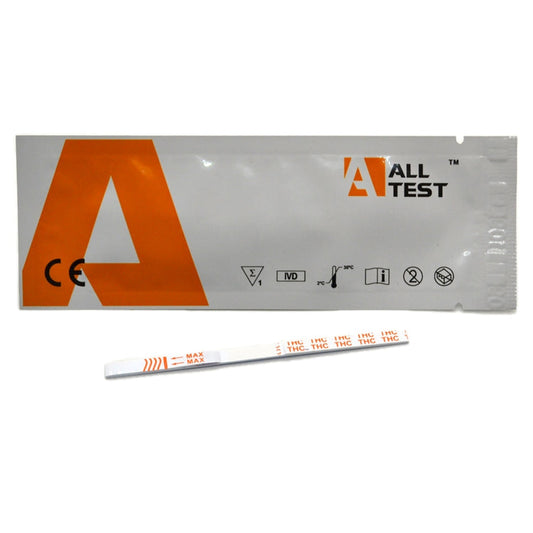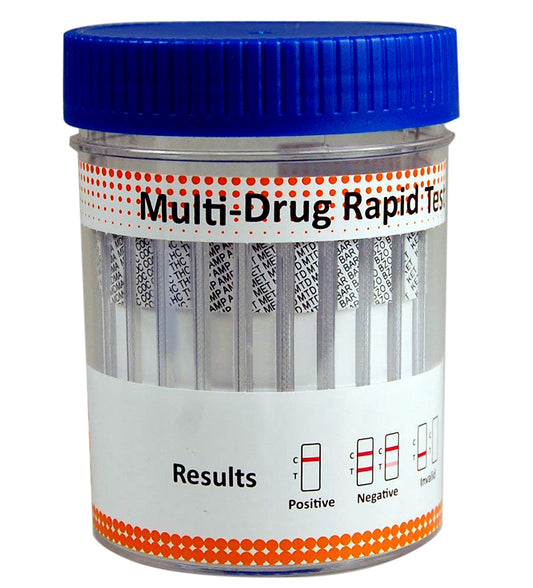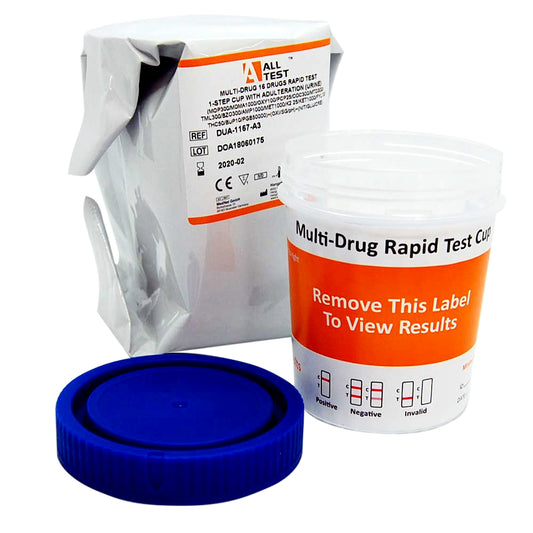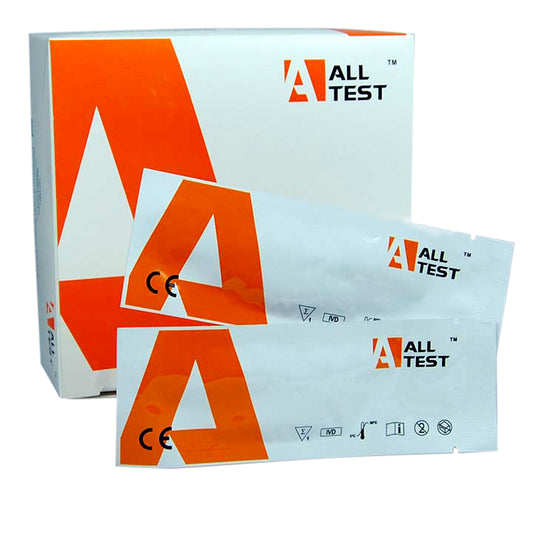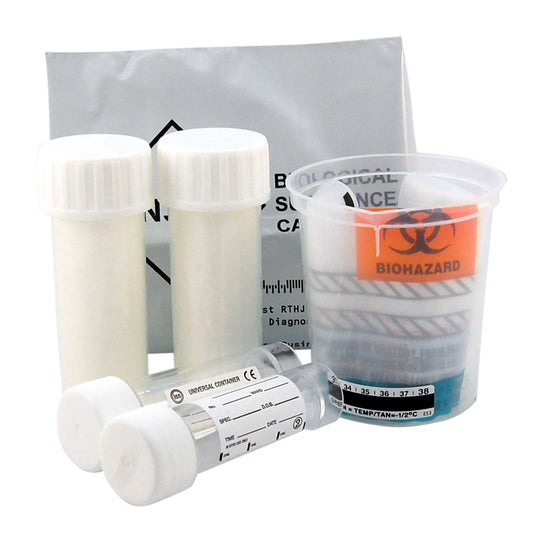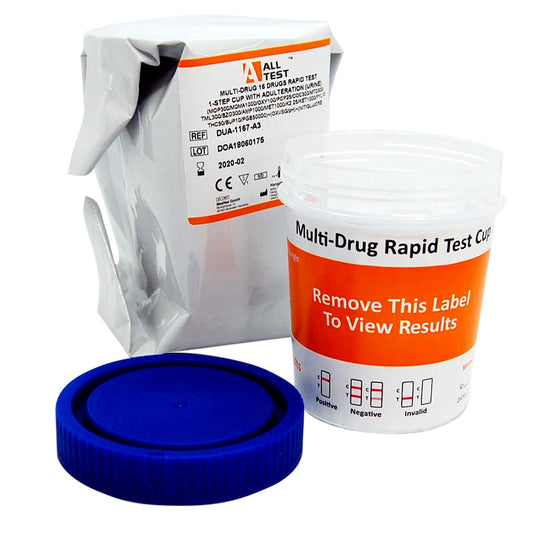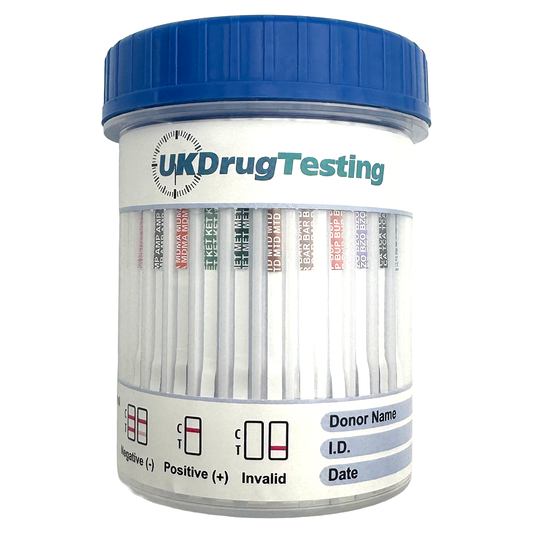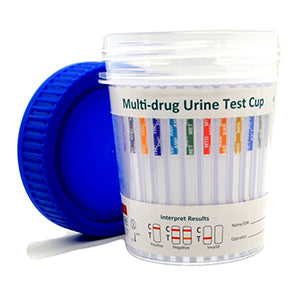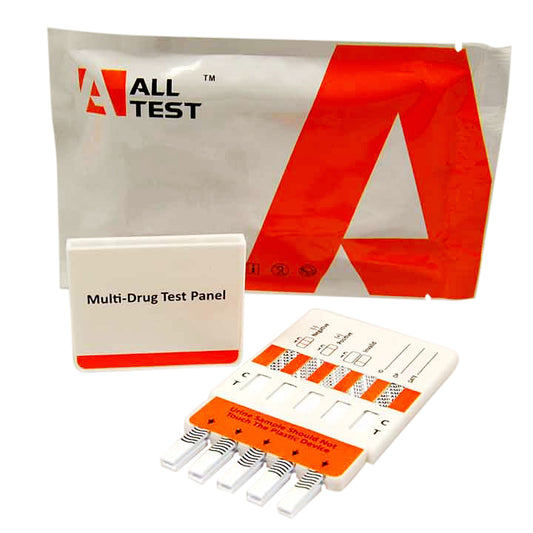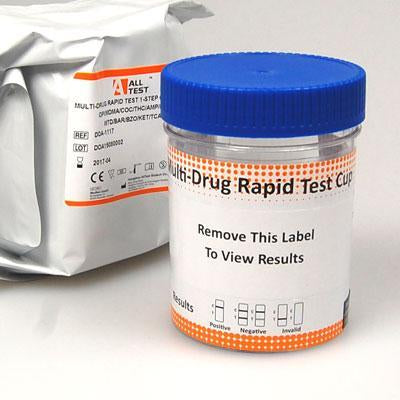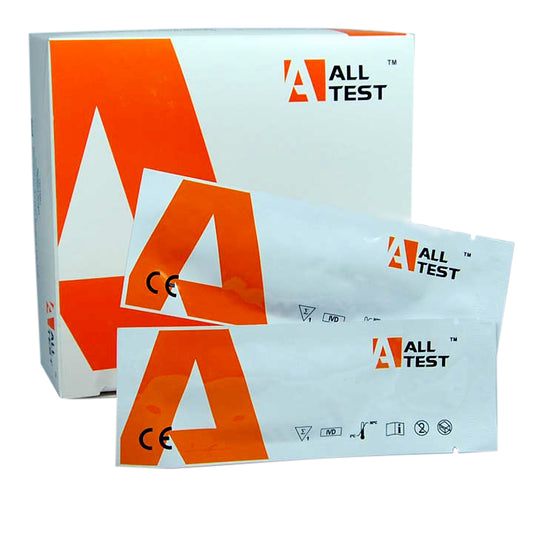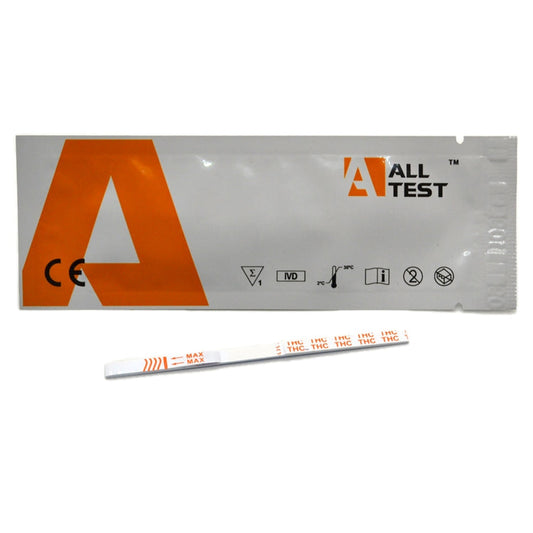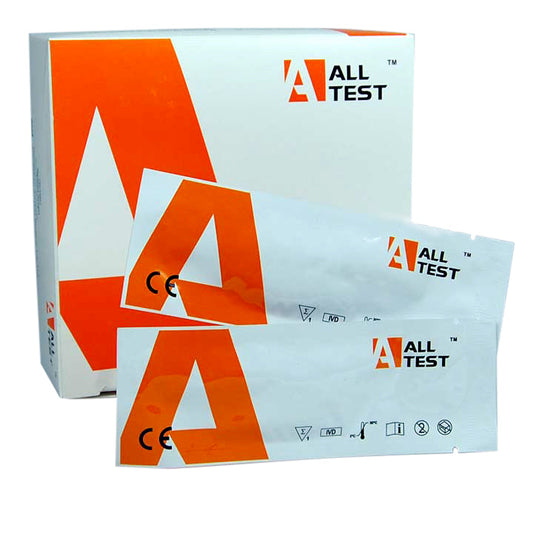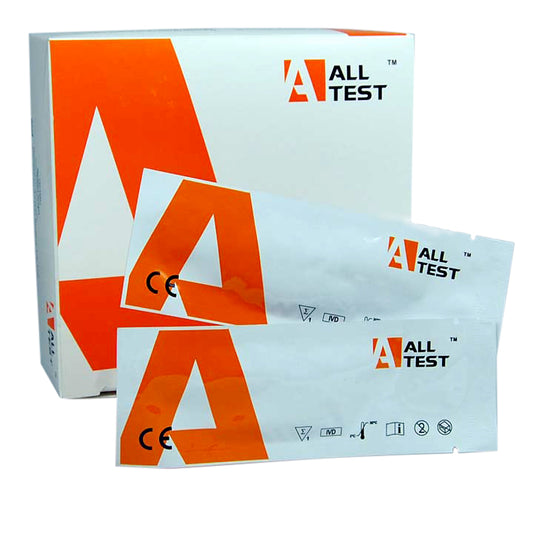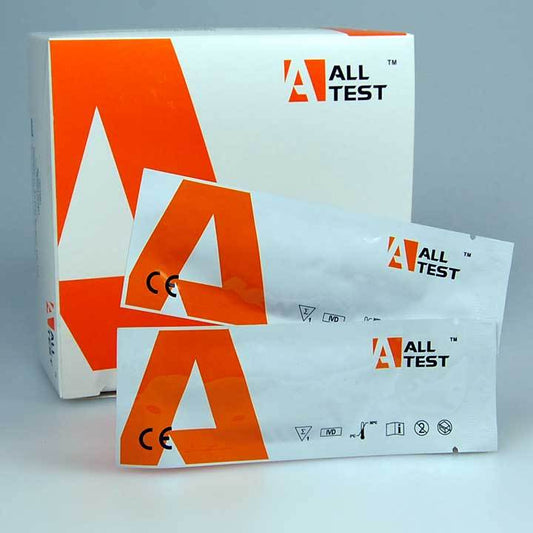Collection: Urine Tests
Urine test strips are a quick, reliable, and cost-effective way to monitor health, detect infections, and screen for substances in urine. At Valuemed, we offer a wide range of urine testing kits, from multi-parameter urine test strips to screen for health conditions to targeted drug and infection tests, designed for both personal and professional use.
-
ALLTEST 10 Parameter URS10 Urinalysis Urine Test Strips Pack of 100 test strips
14 reviewsRegular price From £6.75 GBPRegular priceUnit price / per -
ALLTEST Urine Infection Test Strip
No reviewsRegular price £3.25 GBPRegular priceUnit price / per£3.25 GBPSale price £3.25 GBP -
ALL TEST THC Cannabis Urine Drug Test Strips
1 reviewRegular price From £2.40 GBPRegular priceUnit price / per -
100ml Urine Sample Cups
No reviewsRegular price From £4.99 GBPRegular priceUnit price / per -
Wholesale ALLTEST DOA-1107-B1-TRAM/KET 10 Multi Drug Urine Cup Test
No reviewsRegular price From £2,999.99 GBPRegular priceUnit price / per -
Wholesale ALLTEST DOA-1137-A1 13 Multi Drug Test Kit Urine Cup Test
No reviewsRegular price From £3,400.00 GBPRegular priceUnit price / per -
Wholesale ALLTEST URS 10 Parameter Urine Test Strips Pack of 100
No reviewsRegular price From £347.50 GBPRegular priceUnit price / per -
ALLTEST Ultrasensitive Cocaine Urine Drug Test Strips
No reviewsRegular price From £9.95 GBPRegular priceUnit price / per£9.95 GBPSale price From £9.95 GBP -
ALL TEST Urine Drug Test Strips
No reviewsRegular price From £5.25 GBPRegular priceUnit price / per -
ALLTEST 5 Panel Urine Home Multi Drug Test Kit NPS And 'Legal Highs'
No reviewsRegular price From £4.38 GBPRegular priceUnit price / per -
ALL TEST Cocaine COC Urine Drug Test Strips
1 reviewRegular price From £2.40 GBPRegular priceUnit price / per -
ALLTEST DOA-1137-A1 13 Panel Urine Cup Multi Drug Test Kit
No reviewsRegular price From £7.99 GBPRegular priceUnit price / per -
Fentanyl Urine Drug Test Strips
No reviewsRegular price From £7.95 GBPRegular priceUnit price / per -
Workplace Urine LC-MS/MS Laboratory Confirmation Drug Test Pack(£66 per single drug)
No reviewsRegular price £66.00 GBPRegular priceUnit price / per -


VECHEK 11 Parameter Urine Test Strips For Vets And Pets URS Pot Of 25 Urine Strips Special Offer
2 reviewsRegular price £1.95 GBPRegular priceUnit price / per£5.95 GBPSale price £1.95 GBPSale -
ALLTEST DOA-1107-B1-TRAM/KET 10 Panel Urine Cup Multi Drug Test Kit
No reviewsRegular price From £7.25 GBPRegular priceUnit price / per -
ALLTEST 12 Panel Standard Industry Urine Cup Drug Testing Kit Urine DOA-1127-A3
No reviewsRegular price From £8.25 GBPRegular priceUnit price / per -
UKDrugTesting ULTRA Sensitive 13 Panel Urine Cup Multi Drug Test Kit DOA-1137-A3/Ultra
No reviewsRegular price From £7.99 GBPRegular priceUnit price / per -
Wholesale ALLTEST Combo One 5 Panel Urine Multi Drug Test Kit
No reviewsRegular price From £976.31 GBPRegular priceUnit price / per -
ALLTEST DOA-1107-A1 10 Panel Employment Urine Cup Drug Test Kit
No reviewsRegular price From £6.95 GBPRegular priceUnit price / per -
ALLTEST Ultrasensitive 10ng Cannabis Urine Drug Test Strips
1 reviewRegular price From £9.99 GBPRegular priceUnit price / per -
ALLTEST Ultrasensitive Cotinine Urine Test Strips (Smoking/ Vaping Nicotine Test )
1 reviewRegular price From £5.75 GBPRegular priceUnit price / per -
ALL TEST Benzodiazepine BZO Urine Drug Test Strips
No reviewsRegular price From £3.49 GBPRegular priceUnit price / per -
ALLTEST Amphetamine Urine Drug Test Strips
No reviewsRegular price From £4.95 GBPRegular priceUnit price / per
Urine test strips to screen urine
Valuemed offers a diverse selection of urine test strips, each tailored to specific diagnostic needs. Here's an overview to help you understand the differences between these urine screening products:
1. ALLTEST 10 Parameter URS10 Urine Test Strips
The ALLTEST urine dipstick test strips assess ten critical parameters in urine, including glucose, protein, pH levels, and more. They are designed for general health monitoring and can aid in detecting conditions like urinary tract infections, kidney disease, and diabetes. Each pack contains 100 test strips, making them suitable for both personal and professional use.
2. ALLTEST Urine Infection Test Strip
Specifically designed to detect urinary tract infections (UTIs), this test strip identifies markers such as nitrites and leukocytes in the urine. It's a quick and convenient tool for those who frequently experience UTIs or need immediate results.
3. VECHEK 11 Parameter Urine Test Strips for Vets and Pets
Tailored for veterinary use, these strips test 11 parameters in animal urine, including glucose, protein, and pH levels. They are ideal for pet owners and veterinarians monitoring the health of animals.
4. Drug screeening urine test strips-available as single urine test strips or as part of a multi-panel (multiple urine test strips built into one panel) urine drug test panel or cup-see detailed information below
5. Wholesale Options- For healthcare providers or organisations requiring bulk quantities, Valuemed offers wholesale packs of urine test strips. These are available in large quantities and are suitable for clinics, hospitals, or large-scale health initiatives.
Key Differences in the different kinds of urine tests:
- Purpose: Some urine tests are designed for general health monitoring, while others target specific conditions like UTIs or are tailored for veterinary use.
- Parameters tested: The number of health markers each test strip can detect varies, ranging from single-parameter tests to those assessing up to 11 different parameters.
- Intended users: Products are available for individual consumers, healthcare professionals, and veterinarians, catering to both human and animal health monitoring.
By understanding these distinctions, you can select the most appropriate urine test strip for your specific needs, ensuring accurate and reliable health monitoring.
Urine Drug Tests: Comprehensive urine screening for substance detection
Valuemed also provides a range of urine drug tests that are designed for quick and accurate substance detection. These tests are ideal for workplace drug screening, medical professionals, or personal use. To see are full range of drug tests visit UK Drug Testing. Below are the key features and differences among the available urine drug test products:
1. Multi-Panel urine drug tests
These tests can screen for multiple substances in a single sample, making them efficient for detecting a wide range of drugs. Common panels include drug tests for:
- Cannabis (THC)
- Cocaine (COC)
- Amphetamines (AMP)
- Opiates (OPI)
- Benzodiazepines (BZO)
Multi-panel tests are particularly useful in workplaces or medical settings where broad-spectrum screening is needed. See more multi panel drug test kit
2. Single-panel urine drug tests
Single-panel tests focus on detecting one specific substance, such as cannabis or cocaine. They are ideal for targeted testing when only a particular substance is of concern. These tests are quick, easy to use, and cost-effective and are known as urine drug test strips or urine drug test cassettes (when the test strips is embedded into a test cassette).
3. Instant results with high accuracy
All urine drug tests provided by Valuemed deliver instant results, typically within 5 minutes. They are designed for high accuracy and sensitivity, ensuring reliable detection of even trace amounts of substances.
4. Easy-to-use format
Urine drug tests are straightforward to use, with clear instructions provided. Most come in a dipstick or cassette format:
- Dipstick Tests: Simply immerse the urine test strip in the urine sample for a short time. See our full range of urine drug test strips available at UK Drug Testing.
- Cassette Tests: Use a dropper to place a small amount of urine into the test cassette.
Both formats provide clear visual results, often in the form of lines indicating positive or negative outcomes.
5. Bulk and Wholesale Options
For organizations or businesses conducting frequent testing, Valuemed offers bulk purchasing options. These packs are cost-effective and ensure a consistent supply of high-quality drug tests.
Key Applications
- Workplace drug screening: Ensuring a safe and drug-free environment.
- Rehabilitation centres: Monitoring patients during recovery.
- Healthcare: screening for drug use or compliance with treatment in healthcare setting
- Parental or personal use: For at-home testing with clear, fast results.
By offering a variety of formats and substance panels, Valuemed’s urine drug tests cater to diverse testing needs, making them a trusted choice for both professional and personal use.
Urine testing an overview
Urine tests are a commonly used diagnostic tool in healthcare settings. These tests can provide valuable information about a person's health, including the presence of certain medical conditions or diseases including diabetes, urine infections, kidney disease, and liver disease. At Valuemed, we offer a range of high-quality urine tests for use at home or in a clinical setting. Our selection includes tests for pregnancy, drug use, and a variety of other medical conditions.
One of the most common uses for urine tests is to detect pregnancy. Our pregnancy tests are easy to use and highly accurate, with results available in just a few minutes. They work by detecting the presence of the hormone human chorionic gonadotropin (hCG) in the urine, which is produced by the placenta after a fertilised egg implants in the uterus.
We also offer drug tests that can detect the presence of a wide range of substances, including cannabis, cocaine, amphetamines, and opioids. These tests are often used by employers or healthcare professionals to screen for drug use. In addition to these tests, we offer a range of other urine tests that can help diagnose medical conditions such as urinary tract infections, kidney disease, and diabetes. These tests can provide important information about a person's health and help guide treatment decisions.
At Valuemed, we are committed to providing high-quality urine tests that are affordable and easy to use. All of our tests are manufactured to the highest standards and come with clear instructions for use. We also offer fast and reliable shipping, so you can get the results you need as quickly as possible. If you have any questions about our urine tests or how to use them, our friendly customer service team is always here to help. Thank you for choosing Valuemed for your diagnostic testing needs.
Whether you're tracking your wellness, managing a medical condition, or conducting workplace or veterinary screenings, our urine tests provide accurate results you can trust. Explore our collection today and find the perfect urine tests for your testing needs!
Collapsible content
Can you do a urine test at home?
Yes, you can perform certain types of urine tests at home using over-the-counter kits. These kits are often designed to detect specific substances or conditions such as pregnancy, urinary tract infections, or drug use. They typically include instructions for collecting and testing the urine sample.
Can I buy urine test strips over the counter?
Yes, urine test strips are often available over the counter at pharmacies, chemists, drugstores, and some retail stores. These urine test strips are commonly used for various purposes, such as monitoring general health, managing certain medical conditions (like diabetes), or conducting at-home pregnancy tests. You can typically find them in the health or pharmacy section of the store.
However, the availability of specific types of urine test strips may vary. For example, if you are looking for strips designed to measure glucose levels, ketones, or other specific parameters, you may need to check for strips that cater to those particular needs. Urine test strips are also widely available to buy online.
What indicates a urine infection on a dipstick?
A urine infection, also known as a urinary tract infection (UTI), can be indicated on a urine dipstick by certain abnormalities in the results. The following parameters on a urine dipstick may suggest the presence of a UTI:
- Leukocytes (White Blood Cells): An elevated level of leukocytes in the urine may indicate inflammation or infection in the urinary tract. Leukocytes are often a key marker for the presence of infection.
- Nitrites: Some bacteria, such as Escherichia coli (E. coli), which are common culprits in UTIs, can convert nitrate to nitrite. Detection of nitrites in the urine may suggest the presence of certain bacteria associated with urinary tract infections.
- Blood: Blood on a urine dipstick can be an indication of various conditions, and while it may suggest infection, it is not specific to infection alone. The presence of blood in the urine is called hematuria, and it can be caused by a range of factors.
If you notice abnormal results in these parameters, it's important to consult with a healthcare professional for further evaluation and confirmation of a urinary tract infection. A urine dipstick provides preliminary information, but additional diagnostic tests, such as a urine culture, may be needed for a more accurate diagnosis and identification of the specific bacteria causing the infection.
It's crucial not to self-diagnose or self-treat based solely on the results of a urine dipstick. A healthcare professional can provide appropriate guidance, recommend further tests if necessary, and prescribe antibiotics or other treatments if a urinary tract infection is confirmed.
What are the causes of blood detected on a urine dipstick?
The presence of blood in urine, known as hematuria, can be detected on a urine dipstick and may be caused by various factors.
Here are some common reasons why blood might be detected on a urine dipstick:
- Urinary Tract Infection (UTI): Infections in the urinary tract, including the bladder or kidneys, can lead to inflammation and bleeding, causing blood to be present in the urine.
- Kidney stones: The presence of kidney stones can cause irritation and damage to the urinary tract, resulting in blood in the urine.
- Bladder or kidney Infections: Infections specifically affecting the bladder or kidneys can lead to hematuria.
- Trauma or injury: Physical trauma to the urinary tract, such as a recent injury or surgery, can cause bleeding.
- Inflammation of the genito or urinary tract: Conditions like cystitis, which involve inflammation of the bladder, can lead to blood in the urine.
- Prostate disease: In men, problems with the prostate can sometimes cause bleeding during urination.
- Certain medications: Some medications may cause irritation and result in blood in the urine.
- Inherited conditions: Certain inherited disorders can lead to blood in the urine.
- Menstruation: it is important to remember that in women menstruation can sometimes give a false positive for blood on a urine test strip, as the blood is not coming from the urinary tract but from menstruation.
It's important to note that the presence of blood on a urine dipstick is a preliminary indication, and further evaluation is necessary to determine the underlying cause, and rule out any serious underlying conditions. If you notice blood in your urine or if a dipstick test suggests its presence, it's crucial to consult with a healthcare professional. Additional diagnostic tests, such as a urine culture, imaging studies, or a cystoscopy, may be needed to identify the cause of hematuria and determine the appropriate course of action.
Are all urine test strips the same?
No, not all urine test strips are the same. Urine test strips, also known as urine dipsticks or urine reagent strips (URS for short), come in various types and are designed to measure different parameters in urine. The specific parameters that a urine test strip can detect depend on its intended use and the targeted analytes.
Common parameters measured by urine test strips include:
- pH level: Indicates the acidity or alkalinity of urine.
- Protein: Detects the presence of proteins in urine.
- Glucose: Measures the level of glucose (sugar) in urine.
- Ketones: Identifies the presence of ketone bodies, which may be elevated in conditions like diabetes or ketosis.
- Blood: Detects the presence of blood in urine, which may be a sign of various conditions.
- Specific gravity: Reflects the concentration of solutes in the urine.
- Leukocytes (white blood cells): Indicates the presence of inflammation or infection.
Different brands and types of urine test strips may have variations in sensitivity, accuracy, and the specific parameters they can detect. It's crucial to use the appropriate test strip for the desired purpose, whether it's for general health monitoring, diabetes management, or identifying potential urinary tract infections and to always follow the instructions provided with the urine test strips.
Urine test strips are also available to test for pregnancy , ovulation, female hormones that indicate menopause and for drugs and alcohol.
See all urine test strips available for sale online at Valuemed
Are human and dog urine test strips the same?
While both types of urine test strips are designed to analyse urine for various parameters, they are formulated to detect specific markers relevant to either humans or dogs.
Human urine test strips typically measure markers such as glucose, ketones, pH levels, protein, blood, and specific gravity. These parameters can provide insights into various health conditions in humans.
Dog urine test strips are specifically designed to assess the health of dogs. They may measure the same markers as human urine test strips such as glucose, ketones, pH levels, protein, blood, and specific gravity as well, but the reference ranges and the interpretation of the results can vary between species.
Can you send me a copy of the urine test strips instructions?
All the urine test strips we supply come with a detailed set of instructions for use. If you have lost your instructions and need a copy, you can either download them from the urine test strip product, or email our customer services team and ask them to email you a copy of the instructions.



